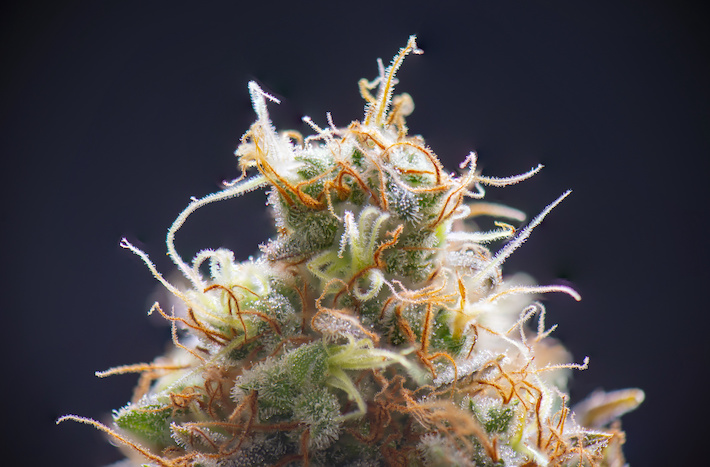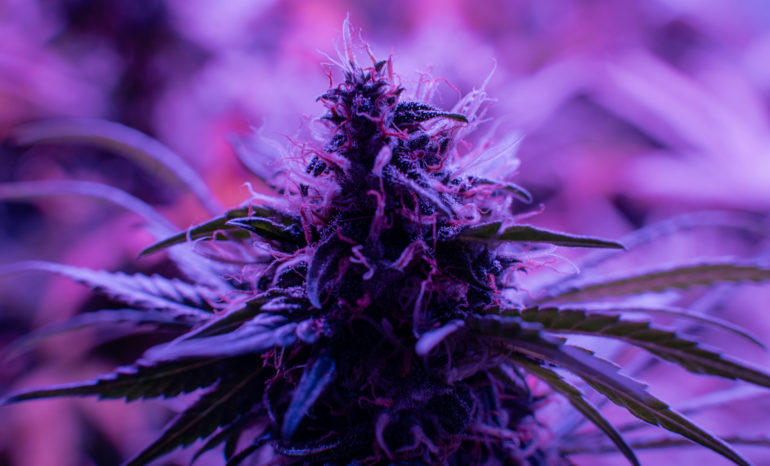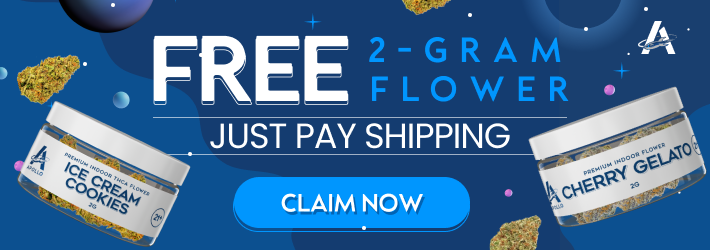CBCV and CBC are nearly identical, and CBC is among the most common cannabinoids there is. Still, one has been much more studied than the other. There is almost nothing known about CBCV, and no one to supply it en masse either outside of a lab.
In the first and only animal trial on it, CBCV failed to produce anticonvulsant effects exhibited by CBC, CBCVA, and CBCA. Its direct side effects are also lacking research, but are probably just like taking CBD oil or hemp flower, since CBCV is similarly non-psychoactive but present in trace amounts.
What Is CBCV?
CBCV, also called cannabichromevarin or cannabivarichromene, is the varinic form of CBC, simply meaning it’s two carbons shorter. CBCV was first isolated in 1975 from the Meao strain of Thai cannabis.

Cannabis plants use CBGVA to make a parallel family of shorter, acidic cannabinoids. Heat and light (aka decarboxylation) turn them into neutral “varin compounds” including THCV, CBDV, and CBCV. In this alternate reality, they typically have a lot in common with their more recognizable doppelgängers – with unique exceptions.
CBCV then is most comparable to CBC. Unfortunately, data on CBCV are basically non-existent. The only known animal study presents unexpectedly disappointing results for CBCV as an anticonvulsant, a property shared by its CBC relatives.
CBCV vs. THC: Key Differences
- THC is the main psychoactive component of cannabis, while CBCV is a rare and non-intoxicating cannabinoid
- THC is available in state-legal marketplaces, conforming to a vast array of product lines. Meanwhile, CBCV is not yet for sale to consumers, only professional researchers can access the compound.
- THC has widely recognized medicinal properties, but CBCV has none yet
CBCV vs. CBD: Key Differences
- CBD is the best-known, medicinal cannabinoid with many confirmed uses. It can be purified into an FDA-approved pharmaceutical called Epidiolex for childhood seizure disorders
- CBCV is not an anticonvulsant, nor prescribed or sold directly to consumers
- CBCV and CBD are found together and have different structures, but nothing is yet really known about CBCV
What Are the Benefits and Effects of CBCV?

So far, no clinical trials exist and only one animal study has been done on CBCV directly. In 2021, researchers compared the anticonvulsant effects of CBCV against its relatives, CBC, CBCA, and CBCVA. Mice were subjected to heat-induced seizures, but unlike the other cannabinoids, there were no anticonvulsant benefits from CBC even at the highest dose of 100 mg/kg.
CBCV and CBC are nearly identical structures, but being two carbons short makes varin compounds hit differently. Full-length CBC is known to largely target CB2 (anti-inflammatory) and pain receptors.
CBCV requires much further investigation to determine to what degree, if any, there are shared potential uses of CBC including, but not limited to:
- Antidepressant effects
- Anti-inflammatory
- Antimicrobial
- Decreasing gut motility in colitis models
- Pain-relieving
- Restoring endocannabinoid tone – Through increased AEA
- Neuroprotective – Possible but less likely, given failed anticonvulsant effects in the first preclinical study
- Anticancer and tumor cell toxic
What Are the Side Effects of CBCV?
To date, the short and long-term side effects of CBCV are entirely unknown. But since it’s found in hemp and CBD oil, CBCV may share common, mild side effects like:
- GI upset like nausea, vomiting, or diarrhea
- Drowsiness and sleepiness
- Reduced appetite
How Much CBCV Should You Take?
Unless you are a lab researcher, purified CBCV remains out of the hands of consumers due to its scarcity, lack of demand, and unknown health effects. We know from clinical trials that CBC is safe and well-tolerated in daily doses up to 26.4 mg, and we might reasonably expect the same from CBCV.
CBCV is still found to some degree naturally in plants, and could theoretically be bred in higher-than-usual quantities. However, today’s breeders are actually selecting for the other minor cannabinoids.
Without any known indications or uses for CBCV, finding a knowledgeable healthcare provider and cannabis coach can be helpful in determining the best available cannabinoid options for you.
Will CBCV Get You High?
No, CBCV will not cause a high. Just like the other minor cannabinoids, none of them are shown to be intoxicating to date. To be psychoactive, a certain double bond is needed in the right place, which CBCV doesn’t have.
Still, CBCV could prove useful someday as a mood-boosting, antianxiety, or antidepressant agent like its cousin CBC and others. CBC can increase anandamide, an endocannabinoid that causes the natural runner’s high. Currently, there’s not enough scientific evidence to prove the same effect for CBCV.
Will CBCV Show Up on a Drug Test?
Most likely not, CBCV is not commonly looked for in drug testing since other cannabinoids are more plentiful and easily detectable in a test. However, CBCV is almost always present with other cannabinoids like CBD and THC. The latter’s metabolite, THC-COOH, is the target of drug testing and not CBCV or its metabolites.
Importantly for consumers, taking any full-spectrum product over time can result in a drug screen flag due to trace, legal THC content. There is a low chance that pure CBD oil and CBCV could contribute to triggering this on their own.
RELATED: What to Know If You’re Taking CBD Before a Drug Test
Conclusion
CBCV could one day prove to be similar to full-on CBC, but so far the results are not promising. It will probably take many more animal studies before humans try out CBCV isolate.
References
- Souza, J. D. R., Pacheco, J. C., Rossi, G. N., de-Paulo, B. O., Zuardi, A. W., Guimarães, F. S., Hallak, J. E. C., Crippa, J. A., & Dos Santos, R. G. (2022). Adverse Effects of Oral Cannabidiol: An Updated Systematic Review of Randomized Controlled Trials (2020–2022). Pharmaceutics, 14(12), 2598. https://doi.org/10.3390/pharmaceutics14122598
- Peters, E. N., MacNair, L., Mosesova, I., Christians, U., Sempio, C., Klawitter, J., Land, M. H., Ware, M. A., Turcotte, C., & Bonn-Miller, M. O. (2022). Pharmacokinetics of cannabichromene in a medical cannabis product also containing cannabidiol and Δ9-tetrahydrocannabinol: A pilot study. European Journal of Clinical Pharmacology, 78(2), 259–265. https://doi.org/10.1007/s00228-021-03232-8
- Walsh, K. B., McKinney, A. E., & Holmes, A. E. (2021). Minor Cannabinoids: Biosynthesis, Molecular Pharmacology and Potential Therapeutic Uses. Frontiers in Pharmacology, 12, 777804. https://doi.org/10.3389/fphar.2021.777804
- Benavides, A. (2021, October 25). All About Anandamide: Taking Cannabinoid Treatment to New Heights. Cannabis Central. https://www.veriheal.com/blog/what-is-anandamide/
- Zagožen, M., Čerenak, A., & Kreft, S. (2021). Cannabigerol and cannabichromene in Cannabis Sativa L. Acta Pharmaceutica, 71(3), 355–364. https://doi.org/10.2478/acph-2021-0021
- Cerino, P., Buonerba, C., Cannazza, G., D’Auria, J., Ottoni, E., Fulgione, A., Di Stasio, A., Pierri, B., & Gallo, A. (2021). A Review of Hemp as Food and Nutritional Supplement. Cannabis and Cannabinoid Research, 6(1), 19–27. https://doi.org/10.1089/can.2020.0001
- Anderson, L. L., Ametovski, A., Lin Luo, J., Everett-Morgan, D., McGregor, I. S., Banister, S. D., & Arnold, J. C. (2021). Cannabichromene, Related Phytocannabinoids, and 5-Fluoro-cannabichromene Have Anticonvulsant Properties in a Mouse Model of Dravet Syndrome. ACS Chemical Neuroscience, 12(2), 330–339. https://doi.org/10.1021/acschemneuro.0c00677
- Salami, S. A., Martinelli, F., Giovino, A., Bachari, A., Arad, N., & Mantri, N. (2020). It Is Our Turn to Get Cannabis High: Put Cannabinoids in Food and Health Baskets. Molecules, 25(18), 4036. https://doi.org/10.3390/molecules25184036
- Stone, N. L., Murphy, A. J., England, T. J., & O’Sullivan, S. E. (2020). A systematic review of minor phytocannabinoids with promising neuroprotective potential. British Journal of Pharmacology, 177(19), 4330–4352. https://doi.org/10.1111/bph.15185
- Shahbazi, F., Grandi, V., Banerjee, A., & Trant, J. F. (2020). Cannabinoids and Cannabinoid Receptors: The Story so Far. iScience, 23(7). https://doi.org/10.1016/j.isci.2020.101301
- Shoyama, Y., Hirano, H., Oda, M., Somehara, T., & Nishioka, I. (1975). Cannabichromevarin and Cannabigerovarin, Two New Propyl Homologues of Cannabichromene and Cannabigerol. Chemical & Pharmaceutical Bulletin, 23(8), 1894–1895. https://doi.org/10.1248/cpb.23.1894

